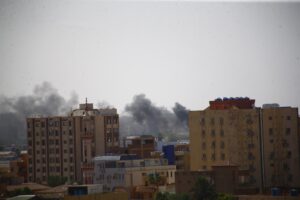Fighting in Sudan has put US embassy staff in danger. An evacuation of the US diplomatic mission in the Sudanese capital of Khartoum – a city of approximately five million people – was carried out early on the morning of April 23 as two factions led by Sudan Army generals engage in pitched battles. The Pentagon announced US Africa Command is “monitoring the situation in Sudan and conducting planning for various contingencies” and is reinforcing its capability in the region as a precaution. A contingent of US troops is on its way to Camp Lemmonier, Djibouti, on the Gulf of Aden, where there is a US Navy expeditionary base. Tensions have escalated between the two warring factions, the Sudanese government Armed Forces (SAF), under the leadership of General Abdul Fatah al-Burhan, and a paramilitary group, the Rapid Support Forces (RSF), led by General Mohamed Hamdan Dagalo, also called Hemedti. The RSF boasts approximately 100,000 fighters. Before the current dust-up between the two forces, they collaborated in 2021 to take control of the Sudan government.
Conflict in Sudan Between Former Colleagues
Over time, however, disputes regarding control of government functions and who would have decision rights on critical governance issues created a rift between the two Sudanese strongmen. Additional sticking points between the factions have been how the RSF, which has operated independently for some time, would be integrated into the SAF. Furthermore, Hemdti and al-Burhan disagreed on how they would transition to a civilian-run government. “The currently developing events in Sudan resemble a typical power struggle seen in fragile states, where more than one powerful armed group exists, and each vies for control,” Dr. Mohamed ElDoh, an expert in defense and security, wrote in Geopolitical Monitor. “However, the political conflict and escalating military confrontation is actually much more complex than a simplistic power struggle.”
As is the case in nearly every geopolitical conflict, each side has its international champions. For example, Hemedti’s RSF group controls the gold mining in Sudan and sells the metal to Russia and the United Arab Emirates (UAE), the largest importer of Khartoum’s gold. But the UAE has strong ties to the Sudanese government. Likewise, Russia has been an arms supplier to the Sudanese government. Now, enter the Russian Wagner Group, a Moscow-directed private military company that has been “strongly associated with protecting gold mines in Sudan, which are controlled by the RSF against the SAF, the latter of which should ‘presumably’ be supported by Russia,” ElDoh explained. Allegiances will be tested in the conflict.

Khartoum, Sudan (Photo by Stringer/Anadolu Agency via Getty Images)
State Department Not Coming to the Rescue
On April 15, the factional disputes turned bloody, and open fighting broke out. Americans living or working in Sudan began calling on the US Embassy for help to get out and not get caught up in the fighting. “What I will reiterate though is that private American citizens should have no expectation of a US government coordinated evacuation at this time and I expect that that’s going to remain the case,” Principal Deputy Spokesman Vedant Patel told reporters at a US State Department Daily Briefing. “It is imperative that US citizens in Sudan make their own arrangements to stay safe in these difficult circumstances.”
Patel explained the State Department put out the latest “Sudan Travel Advisory Level 4: Do Not Travel” dated April 19, 2023 – as it has been doing for months. One question from the assembled reporters referenced a White House statement about how it relied on lessons learned from the disastrous Afghanistan withdrawal, one of which was to think about non-combatant evacuation operations early. But here we are with escalating hostilities in a foreign country, and the State Department is telling US citizens they are on their own.
“Secretary Blinken expressed grave US concern about the risk to civilians, humanitarian and diplomatic personnel, including US personnel,” the State Department said in a press release. We know intense fighting continues, despite a ceasefire supposedly in effect until Sunday, April 23. Fox News reported that one American – whose identity was not released – had been killed in the violence. The Khartoum international airport is closed because of the violence, making an overland evacuation of US personnel potentially the only option. The number of US personnel in Sudan who might be seeking assistance getting to safety is not known precisely. “An estimated 16,000 private U.S. citizens are registered with the embassy as being in Sudan,” Military Times reported, “but the State Department has cautioned that that figure is likely inaccurate as there is no requirement for Americans to register nor is there a requirement to notify the embassy when they leave.”
Secretary Blinken reached out to both faction leaders, encouraging them to observe the ceasefire, but that diplomatic effort has so far been unsuccessful. However, it would be a good idea for the White House to redouble its efforts to get the warring factions to stop the fighting. Unfortunately, the Biden administration has not been successful on similar occasions. As the situation worsens, US diplomatic staff had been hunkering down in the Embassy or sheltering in their homes until they were airlifted out by American troops. The status of other Americans is unknown.
The views expressed are those of the author and not of any other affiliation.
All opinions expressed are those of the author and do not necessarily represent those of Liberty Nation.
Do you have an opinion about this article? We’d love to hear it! If you send your comments to [email protected], we might even publish your edited remarks in our new feature, LN Readers Speak Out. Remember to include the title of the article along with your name, city, and state.
Please respect our republishing guidelines. Republication permission does not equal site endorsement. Click here

